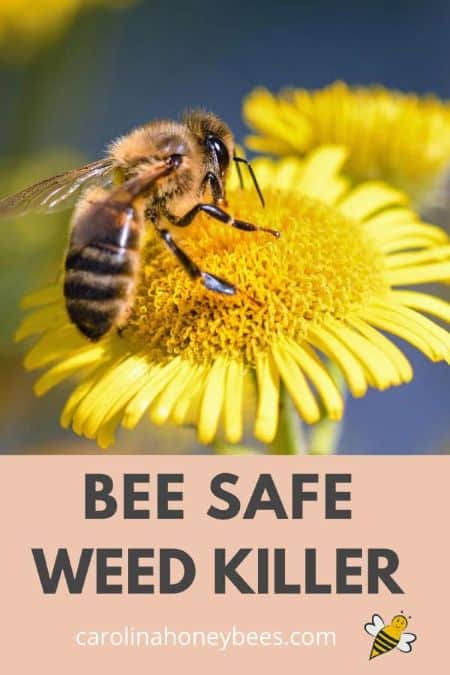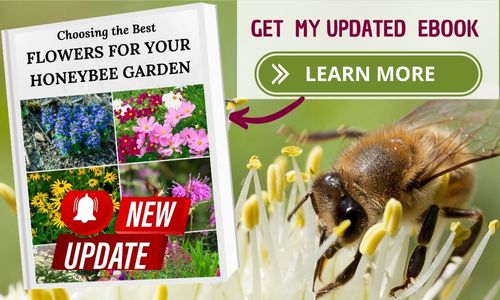Bee Safe Weed Killer
If you are a gardener in search of a bee safe weed killer, you are in for a challenge. Controlling undesirable weeds and protecting pollinators (like bees), requires some careful thought. Finding a bee safe weed killer or weed control method that takes care of the problem with few residual effects is not easy. But, you do have some options.
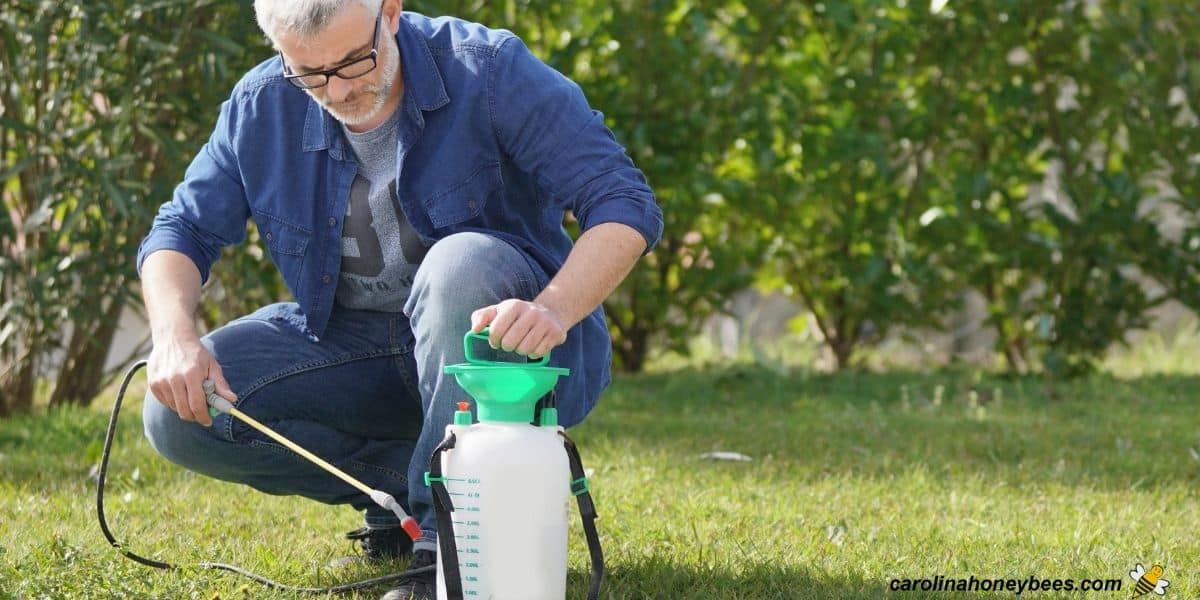
It can be a struggle to maintain a bee friendly garden and still practice weed control. This is something I always struggle with. But, it is possible with a bit of research and persistence. Sometimes the best methods work a bit slower but they are better for the environment.
Bee Friendly Natural Weed Killers
As a beekeeper, I am always concerned about the use of any chemical near the hives. But, you don’t have to be a beekeeper to care about pollinators and want to help save bees.
This involves planting flowers that attract bees if you have the space. But that’s not all. Using fewer chemicals, or at least – less toxic ones is a good choice too.
A gardener has several options to consider for weed control:
- weeding by hand
- using mulch wisely
- bee friendly weed applications

Hand Weeding
The most effective bee safe weed killer is your two hands and a hoe. The time-honored method of pulling weeds is one way to remove them from the yard.
Honestly, a determined gardener with a hoe is the most bee friendly way to kill weeds that you will find. Some homeowners use a special propane torch to kill weeds when fire danger is not a problem.
But, I realize that this is not always practical. Some people do not have the physical ability or time to weed their garden by hand.
Mulching
Another important tool is good use of mulch. A thick mulch coat can smother many small weeds and result in less need to use chemicals.
I like to use mulch along with a granular herbicide to prevent weeds for a bit. While not an inert product, the danger to bees is minimal if the herbicide is used as directed.
Planning your garden design well with groupings of plants that feed bees placed close together can reduce the room for weeds to flourish.
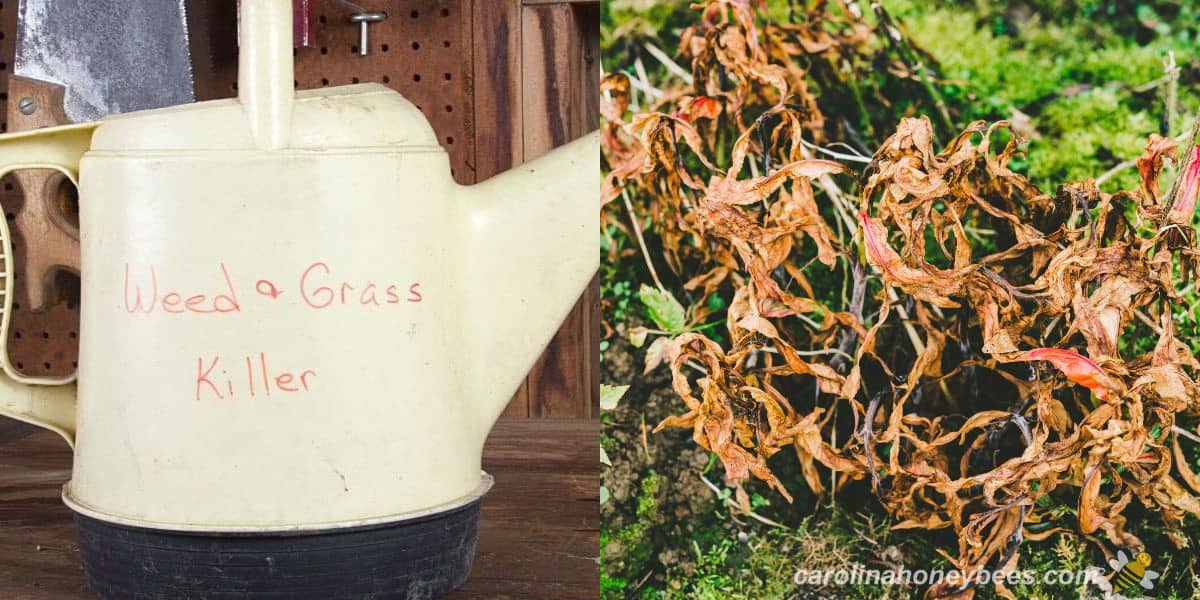
DIY Vinegar Weed Killers
Another option, is the use of bee friendly weed killers that are safe for the environment. However, these also should be used with restraint and only as much as is needed to control undesirable vegetation.
White vinegar or apple cider vinegar are popular ingredients in several homemade weed killer spray (using vinegar). Either regular or Epsom salt can be added to increase efficacy.
Just because they use common household ingredients – don’t think they are not strong. Use them with care and take the same precautions as you would with other chemicals.
Does it work? Does it wipe things out quickly in a “one and done” style like glyphosate? No, it will need to be repeated – perhaps several times.
This post may contain affiliate links. As an Amazon Associate, I earn from qualifying purchases. Please read my disclosure.
But, it is an effective way to kills weeds and relatively inexpensive. Spray late in the day when most bees have stopped foraging.
The same applies to protecting bees from mosquito spraying-spray late in the day when most of the foraging has stopped.
You will need to repeat application throughout the summer as more weeds will return. In truth, natural sprays don’t seem to work as long as commercial mixtures.
If you want a ready to use option that is safer for bees and kids – try this mix from Eco Garden.
Corn Gluten for Weed Control
Another bee safe weed control involves the use of corn gluten. Available in pellets, powder or granules it is a byproduct from the milling of corn.
It works as a pre-emergent – preventing new weeds. While it won’t kill existing weeds, it does a pretty good job of preventing new weed seeds from sprouting.
Most formulations (like this one from Jonathan Green works as fertilizer too). And as always, when using any type of herbicide avoid getting it on desirable vegetation.

Bee Safe Weed Killers for Lawn Care
Safely controlling weeds in a lawn calls for a different approach. It can be difficult to kill the green weed and not damage the green grass. One person’s weed is another person’s flower after all.
One of the most popular options – even for lawns is corn gluten meal. This can be a bee, kid and dog safe way to reduce weeds. However, it must be used properly to get good results.
You can find several commercial products labeled as weed killers safe for bees to use on your lawns. 2,4-D and Atrazine are two herbicides studies show to be safe for use in areas with bees.
Each manufacturer has a slightly different ingredient profile – read the label carefully before using. Products such as these have labels with a lot of information in tiny print that we may not always understand. However, they do contain information about their toxicity to bees.
If you must have a weed free green lawn, follow these practices to minimize damage to pollinators.
- use the least toxic formula you can find
- spray late in the day
- if weeds are in bloom – mow them off before applying herbicides (or apply at a time when the weeds are not in bloom)
- leave your grass longer for healthier turf
Why are Commercial Herbicides so Popular?
Chemicals that kill weeds are called “herbicides”. But, they can become “pesticides” – chemicals that kill insects too.
They may not kill bees right away. Yet, poisons taken back to the hive can wipe out the next generation of bee brood-resulting in a dead colony.
Even those hives that survive can suffer a higher bee mortality rate due to exposure. The same is true for native bees that are exposed to poison.

Commercial weed killers have grown in popularity due to their ease of use. They can be purchased in a concentrated form and diluted with water to cover a large area.
Most of them work well when used according to the label and some control weeds with 1 day of application. However, there is increasing concern about the effects of their use on our environment.
Is our soil and water suffering contamination that then leads to an unsafe food chain? Many people think so.
Also, the chemical seems to stay in the environment. Showing up in soil samples, water, nectar, pollen etc – who knows the true scale of the problem.
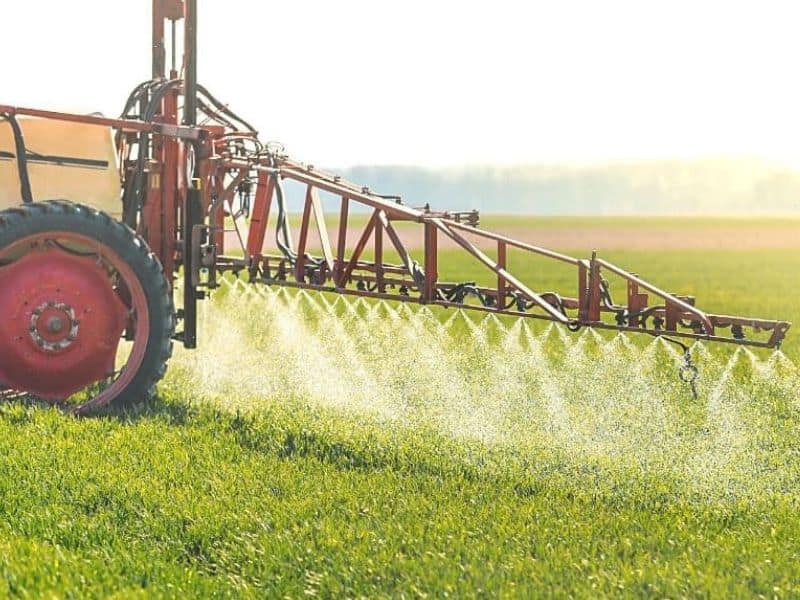
Roundup or Glyphosate
Any article pertaining to the use of weed or grass killers must contain a mention of glyphosate, the most widely used herbicide in the world. It is commonly known as Roundup-but Roundup (a brand name) contains other chemicals too.
Glyphosate is a broad spectrum systemic herbicide. It is listed as the primarily active ingredient in many weed control products. The manufacturer maintains that it is safe when used as directed.
Yet, many studies have suggested serious negative effects on bees (and maybe ourselves) from the use of this product in our environment.
According to a study by the University of Texas, glyphosate kills beneficial bacteria in the bee’s gut. This results in sick unhealthy bees.
I don’t know what the true answer is regarding the danger of this product. But, why take the chance – try to avoid it – and always read the label on any product you apply to outdoor foliage.
Leave Natural Areas
Most homeowners spend at least a part of their Summer season in a battle against weeds. I encourage everyone to try to set aside areas for natural plant growth to help pollinating insects.
Some weeds – even dandelions provide food for bees and other pollinators. Leaving them for a few weeks in early Spring can be a significant help to growing bee colonies.
FAQs
Yes, glyphosate can result in bee deaths. However, other herbicides can also be toxic to bees if used improperly.
Yes, vinegar is an acid and is toxic to bees if sprayed on them. When using in the garden, always take care to use the proper concentration and do not spray directly on bees or flowers they are visiting
These types of lawn care products are relatively non-toxic to bees. Use a granular form when possible and apply when bees are not actively foraging.
Wrapping It Up
In general, weeds are good for bees, try to leave a few when you can. They can also help retain soil and prevent erosion.
For those locations that really need some weed control, consider trying some of these natural controls: weed by hand, mulch or whip up a simple recipe to spray on unwanted plants. Avoid using pesticides such as sevin dust-which is not bee friendly on plants they may visit.
Any time you use chemicals you must consider possible danger to the ecosystem. Take care when spraying weeds or even trying to keep bees away from your hummingbird feeders. You may be doing more harm than you realize.

